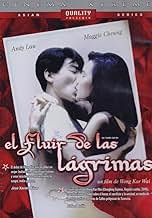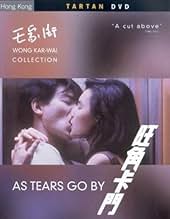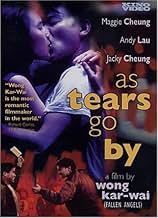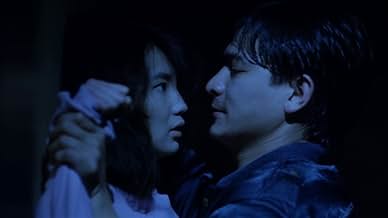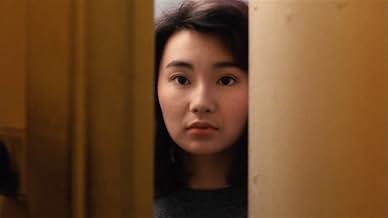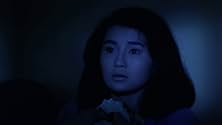AVALIAÇÃO DA IMDb
7,0/10
13 mil
SUA AVALIAÇÃO
O gângster Wah se apaixona por sua bela prima, mas também deve continuar a proteger seu parceiro volátil no crime e amigo, Fly.O gângster Wah se apaixona por sua bela prima, mas também deve continuar a proteger seu parceiro volátil no crime e amigo, Fly.O gângster Wah se apaixona por sua bela prima, mas também deve continuar a proteger seu parceiro volátil no crime e amigo, Fly.
- Prêmios
- 2 vitórias e 10 indicações no total
- Direção
- Roteiristas
- Elenco e equipe completos
- Produção, bilheteria e muito mais no IMDbPro
Avaliações em destaque
Wong Kar Wai's debut effort as a feature film director already showcase flashes of talent from the would-be auteur. ALthough not as groundbreaking or innovative as some of his better known films (eg. Chungking Express/ Fallen Angels), nevertheless it displayed some of his distinct signature styles, (eg. naturalistic & idiosyncratic dialogue, character driven films) and themes(eg. love,urban environment, world in turmoil and chaos)
Obviously inspired by Martin Scorsese's early effort 'Mean Streets', which was in turn partly inspired by 'beat' filmmaker John Cassevetes debut film 'Shadows'; 'As Tears Go by' is 'Mean streets' set in Hong Kong. The harsh depiction of traid and street gang culture is in sharp contrast to the stylish gun-totting hoods from John Woo's 'A Better Tomorrow'. In many ways, Wong's depiction came accross as more bittingly realistic, helped by its many on-location filming (another WKW style). Hong Kong's neon lit streets/dark dingy alleys/fluorescence interiors/late night piers, blended in perfectly with Wong's story set in contemporary urban HK. Very interesting camera work and lighting that is different from the other HK films coming out from that era. It displayed an early WKW visual flare, again evident in Chunking Express and Fallen Angels, which utilizes similar locations and settings, as well as ferentic camera movements and stylised composition. Credit should be due to art director Chang Shu Ping, who collaborated with Wong in all of his subsequent films. Of note too is cinematographer Andrew Lau, who will go on to helm the 'Young & Dangerous' series that bears several visual & subject matter influences from this film.Though I must add that Young & Dangerous portrayal of heroic gansters is more glorifying than Wong's pathetic bloodied characters.
Excellant performances from all three leads, which bagged Jacky CHeung(doing a Robert de niro) the best supporting actor and Andy Lau a nomination for best actor at that year's HK film awards. Maggie Chueng claimed that this was the first time she discovered the true potential of screen acting. Also unforgettable is Alex Man's supporting turn as the most sadistic villian imaginable.
'As Tears go By' is probably the only WKW film that is fully scripted (WOng served as a scriptwriter in other generic HK movies for several years before this effort), and it shows. Some clever and subtle original touches in the first act, that translates Scorsese's tortured characters and ethnic Itlian dispora to local HK flavor and motivations. However, the conflict dragged on by the second act, and the film seems indecisive as whether to focus on the Andy Lau/Maggie Cheung love story arc or on his dillema with his understudy pal Jacky Cheung and their conflict with bad ass Alex Man. Scorsese's 'Mean Streets' works because it manages to stay focus on the main protaganist POV and motivations. The whole film is centered around Harvey Keitel's character, and the other characters serves as his burden to his climb up the mafia ranks. That direction seems lost in Wong's version. The last act/conclusion seems rushed, cliche and definitely predictable. What I suspect, and logically seems plausible, is the interference of the producers and financiers on 'As Tears go by'. WOng had claimed in interviews that his early work was being hampered in many ways by others, hence his firm decision and insistence to be the producer in all his subsequent films. He wants to and achieves total artistic control over all of his later films.
Nevertheless, 'As Tears Go by' is without a doubt a milestone of WOng's career as well as Hong Kong cinema. The visceral on-screen violence, realistc seedy portrayal of HK's underworld and streets locale, and cosmopolitan loves and relationships was never before seen on HK screens during its day. It is preceded only by John Woo's 'A Better Tomorrow', which in many ways is a different kind of film with very different themes. Definitely worth catching for fans of Wong Kar Wai and those who love Hong Kong cinema.
7/10 from me.
Obviously inspired by Martin Scorsese's early effort 'Mean Streets', which was in turn partly inspired by 'beat' filmmaker John Cassevetes debut film 'Shadows'; 'As Tears Go by' is 'Mean streets' set in Hong Kong. The harsh depiction of traid and street gang culture is in sharp contrast to the stylish gun-totting hoods from John Woo's 'A Better Tomorrow'. In many ways, Wong's depiction came accross as more bittingly realistic, helped by its many on-location filming (another WKW style). Hong Kong's neon lit streets/dark dingy alleys/fluorescence interiors/late night piers, blended in perfectly with Wong's story set in contemporary urban HK. Very interesting camera work and lighting that is different from the other HK films coming out from that era. It displayed an early WKW visual flare, again evident in Chunking Express and Fallen Angels, which utilizes similar locations and settings, as well as ferentic camera movements and stylised composition. Credit should be due to art director Chang Shu Ping, who collaborated with Wong in all of his subsequent films. Of note too is cinematographer Andrew Lau, who will go on to helm the 'Young & Dangerous' series that bears several visual & subject matter influences from this film.Though I must add that Young & Dangerous portrayal of heroic gansters is more glorifying than Wong's pathetic bloodied characters.
Excellant performances from all three leads, which bagged Jacky CHeung(doing a Robert de niro) the best supporting actor and Andy Lau a nomination for best actor at that year's HK film awards. Maggie Chueng claimed that this was the first time she discovered the true potential of screen acting. Also unforgettable is Alex Man's supporting turn as the most sadistic villian imaginable.
'As Tears go By' is probably the only WKW film that is fully scripted (WOng served as a scriptwriter in other generic HK movies for several years before this effort), and it shows. Some clever and subtle original touches in the first act, that translates Scorsese's tortured characters and ethnic Itlian dispora to local HK flavor and motivations. However, the conflict dragged on by the second act, and the film seems indecisive as whether to focus on the Andy Lau/Maggie Cheung love story arc or on his dillema with his understudy pal Jacky Cheung and their conflict with bad ass Alex Man. Scorsese's 'Mean Streets' works because it manages to stay focus on the main protaganist POV and motivations. The whole film is centered around Harvey Keitel's character, and the other characters serves as his burden to his climb up the mafia ranks. That direction seems lost in Wong's version. The last act/conclusion seems rushed, cliche and definitely predictable. What I suspect, and logically seems plausible, is the interference of the producers and financiers on 'As Tears go by'. WOng had claimed in interviews that his early work was being hampered in many ways by others, hence his firm decision and insistence to be the producer in all his subsequent films. He wants to and achieves total artistic control over all of his later films.
Nevertheless, 'As Tears Go by' is without a doubt a milestone of WOng's career as well as Hong Kong cinema. The visceral on-screen violence, realistc seedy portrayal of HK's underworld and streets locale, and cosmopolitan loves and relationships was never before seen on HK screens during its day. It is preceded only by John Woo's 'A Better Tomorrow', which in many ways is a different kind of film with very different themes. Definitely worth catching for fans of Wong Kar Wai and those who love Hong Kong cinema.
7/10 from me.
Andy Lau is a hood who has no time for life, just brief respites. His last girl friend had her pregnancy terminated before even telling him about it, because he hadn't called in a while. "You could have called me!" he says, but three years with him have yielded her neither money nor marriage. So he gets drunk and comes home to his bare apartment where his distant cousin, Maggie Cheung is staying while doctors run tests to see if she is going to die. Then she turns out to be ok, and goes home, while he stays and deals with the gangs of Hong Kong, particularly his inept "little brother" Jacky Cheung, and the competing gangs, and the ugly messiness that is his life.
Then he shows up at Miss Cheung's. When he has to go back to Hong Kong to deal with Jacky's messes, she says nothing, but calls his phone service and leaves a message. "Come back safely."
Kar-Wai Wong's first feature as a director can be viewed as a gloss on Melville's LE SAMOURAI, but it is not an admiring one. Lau is all professional when dealing in the underworld, but outside of it he needs to be human, wants family and love, things barred to him by his trade. Melville's romantic impulses are based on violence, the thought of the smooth, dangerous man in a beautiful and clean world populated by elegant adults, like a shark swimming through the clean ocean. Wong's world is crowded and garish ad ugly, populated by psychopaths and would-be psychopaths. Wong's sense of beauty lies in the respites, in Miss Cheung's arms, in people who care. I find it far more believable.
Then he shows up at Miss Cheung's. When he has to go back to Hong Kong to deal with Jacky's messes, she says nothing, but calls his phone service and leaves a message. "Come back safely."
Kar-Wai Wong's first feature as a director can be viewed as a gloss on Melville's LE SAMOURAI, but it is not an admiring one. Lau is all professional when dealing in the underworld, but outside of it he needs to be human, wants family and love, things barred to him by his trade. Melville's romantic impulses are based on violence, the thought of the smooth, dangerous man in a beautiful and clean world populated by elegant adults, like a shark swimming through the clean ocean. Wong's world is crowded and garish ad ugly, populated by psychopaths and would-be psychopaths. Wong's sense of beauty lies in the respites, in Miss Cheung's arms, in people who care. I find it far more believable.
Kar-Wai's first film is more in line with the cinematography of other late 80's Hong Kong movies rather than his renown obscure style, seen later on in films like Chungking Express or In the Mood For Love. The characters are also normal in comparison to his later films too, as they take on archetypes seen in many Triad flicks from this era. The writing is classic Wong Kar-Wai however, and what he does with the characters is more interesting then their personalities themselves. In other words their actions speak volumes louder than their dialogue. Andy Lau plays a low-level Triad thug who in hopes of climbing the underworld's ranks becomes held down by his younger brother played by Jacky Cheung. The pair work well together and you begin to like the dynamic bond between them. Trouble ensues between the pair and their gang, and many hard decisions await Andy Lau as he tries to straighten out both his reckless brother and forbidden romance on the side. The ending has a real impact and Wong Kar-Wai's direction is responsible for such a memorable story. Although it feels Kar-Wai wasn't fully at the reigns of this one with some mediocre moments, overall his efforts can be felt wholeheartedly and the passion shines through to deliver a good experience. -7/10
My feelings towards this film was mixed. In a way it seems to be overrated, just because it was Wong Kai Wei's first film and it was probably his only commercial and gangster film. It was very typical of Hong Kong gangster film in the 80s, with the same overplayed message of loyalty and the main characters trying to prove their value being the central theme. The story was plain and dull, and truthfully, it was another one of the gangster films made in the 80s that is influence by John Woo. Still, I feel this movie deserved some credit for being raved about in certain circles. First of all, this was one of the better gangster films out there, and even though the subject of loyalty seemed overplayed, it was still touching to see the friendship of a boss and his follower. Secondly, and very interestingly, the movie was filmed with an artistic touch. I have rarely seen a gangster film incorporating artistic techniques, such as the distortion of time or using shots of nature, signatures of Wong Kai Wei's latter films, but these artistic scenes became memorable. How could I ever forget the scene where Maggie was walking gingerly through the door, stopped, hesitated for a moment, but continued and slowly, but with class of a true lady, make her way up the stairs? That scene was unforgettable. Although the viewer could only see her back, but from her back, she was still able to project the feeling of uncertainty, but in the end, bravery for going after her love. Usually a scene like this would only be seen in art films, and rarely in a gangster film. In this film, however, the artistic touch only added to the movie's special appeal. A lot of Wong's artistic shots were unforgettable.
The performances by the two lead actors, Andy Lau and Jackie Cheung, were solid and touching, but far from spectacular. A lot of times I feel their expressions, especially Lau, were forced. Jackie Cheung seemed more natural in his acting, but his expressions were exaggerated, probably exaggerated to enforce his aura of cockiness, an aura that was not believable. Future films of the two stars, especially the recent ones, had better performances, and the viewer could see their vast improvements. The performance of Maggie Cheung must be complimented. Her sweet naiveness was so convincing that I had a hard time linking her with the ditsy roles she took before, such as in the Police Story. One could tell big things were ahead for her, and her future success proved it.
Overall, very interesting film, but just another one of the 80s gangster film.
7/10
The performances by the two lead actors, Andy Lau and Jackie Cheung, were solid and touching, but far from spectacular. A lot of times I feel their expressions, especially Lau, were forced. Jackie Cheung seemed more natural in his acting, but his expressions were exaggerated, probably exaggerated to enforce his aura of cockiness, an aura that was not believable. Future films of the two stars, especially the recent ones, had better performances, and the viewer could see their vast improvements. The performance of Maggie Cheung must be complimented. Her sweet naiveness was so convincing that I had a hard time linking her with the ditsy roles she took before, such as in the Police Story. One could tell big things were ahead for her, and her future success proved it.
Overall, very interesting film, but just another one of the 80s gangster film.
7/10
Wong Kar-Wai's feature debut is essential viewing for anyone who's been beguiled by his more recent work, but it is really just a slightly more existential take on the standard HK gangster pic. It has more commercial considerations, less emotional complexity (or navel-gazing, if you side with Jackie Chan, who called him "the most boring film-maker on the planet")* than 'Fallen Angels' or 'In the mood for love', but there's much to admire in his idiosyncratic digressions from generic conventions. Maggie Cheung, surely one of HK's finest actresses, but so rarely allowed to prove it, is slightly wasted here. Her performance is pleasingly internal and understated, far-removed from the pseudo-comic mugging she made to enact in the Police Story movies which made her famous, but her character is really just the pining girlfriend, an iconic figure of a better future. I can fully accept Cheung as the embodiment of all that is feminine and comforting in the world, but her role is a slight disappointment given the screen-melting roles Wong handed to Brigitte Lin, Faye Wong, Karen Mok and Cheung herself in later films. And, by the way, this is very violent.
* Jackie Chan also said that Amy Yip was the ugliest woman in the world and that ladies shouldn't fight in movies.
* Jackie Chan also said that Amy Yip was the ugliest woman in the world and that ladies shouldn't fight in movies.
Você sabia?
- CuriosidadesFirst film directed by Wong Kar-Wai.
- Erros de gravaçãoWah's facial bruises shift tremendously near the final scene from the time he got on the bus to the time he met Fly.
- Versões alternativasSome home-video releases have different endings, which differ from the original in tone, editing, and duration. There are two of these alternate endings: one which extends the original ending by 2-1/2 minutes, the other an additional 2 minute "happy" ending. Both alternate endings are included on Criterion's Blu-ray release of the film in 2 bonus tracks, and are available for streaming on the Criterion Channel.
- ConexõesFeatured in Fandor: Borrowing Time with Wong Kar-wai (2018)
Principais escolhas
Faça login para avaliar e ver a lista de recomendações personalizadas
Detalhes
Bilheteria
- Faturamento bruto nos EUA e Canadá
- US$ 9.436
- Fim de semana de estreia nos EUA e Canadá
- US$ 4.279
- 4 de mai. de 2008
- Faturamento bruto mundial
- US$ 13.133
Contribua para esta página
Sugerir uma alteração ou adicionar conteúdo ausente

Principal brecha
What is the Canadian French language plot outline for Conflito Mortal (1988)?
Responda

